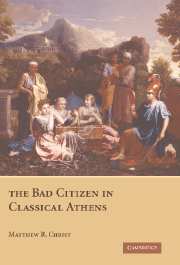Introduction: The Other Athenians
Published online by Cambridge University Press: 02 December 2009
Summary
The remarkable spread of democracy in the late-twentieth century has led to renewed interest in the roots of western democracy in ancient Athens. This study examines a facet of the Athenian experience that has received less scholarly attention than it deserves: the nature and scope of bad citizenship in classical Athens (508/7–322/1 B.C.) and the city's responses, institutional and ideological, to this. Good citizenship is not ubiquitous in modern democracies, and it was not in democratic Athens. This presented the city with practical challenges, as it sought to limit the scope for bad citizenship through its administrative structures and legal institutions. At the same time, however, bad citizenship challenged Athenian ideals concerning the relationship between individual and state, and elicited a range of ideological responses from the city. How Athens responded to these diverse challenges within a democratic framework is fundamental to our understanding of it.
Although Athenian citizenship bore numerous responsibilities, implicit and explicit, for the exclusive group of adult men who possessed it, this study focuses on two formal obligations that were central to it. Citizens were expected, if called upon, to perform military service as hoplites and to support the city financially in a variety of ways; as Athenian sources pithily put it, citizens were to serve their city with “person and property.” While these obligations could potentially be imposed on any citizen, in practice they did not fall equally on all individuals.
- Type
- Chapter
- Information
- The Bad Citizen in Classical Athens , pp. 1 - 14Publisher: Cambridge University PressPrint publication year: 2006



